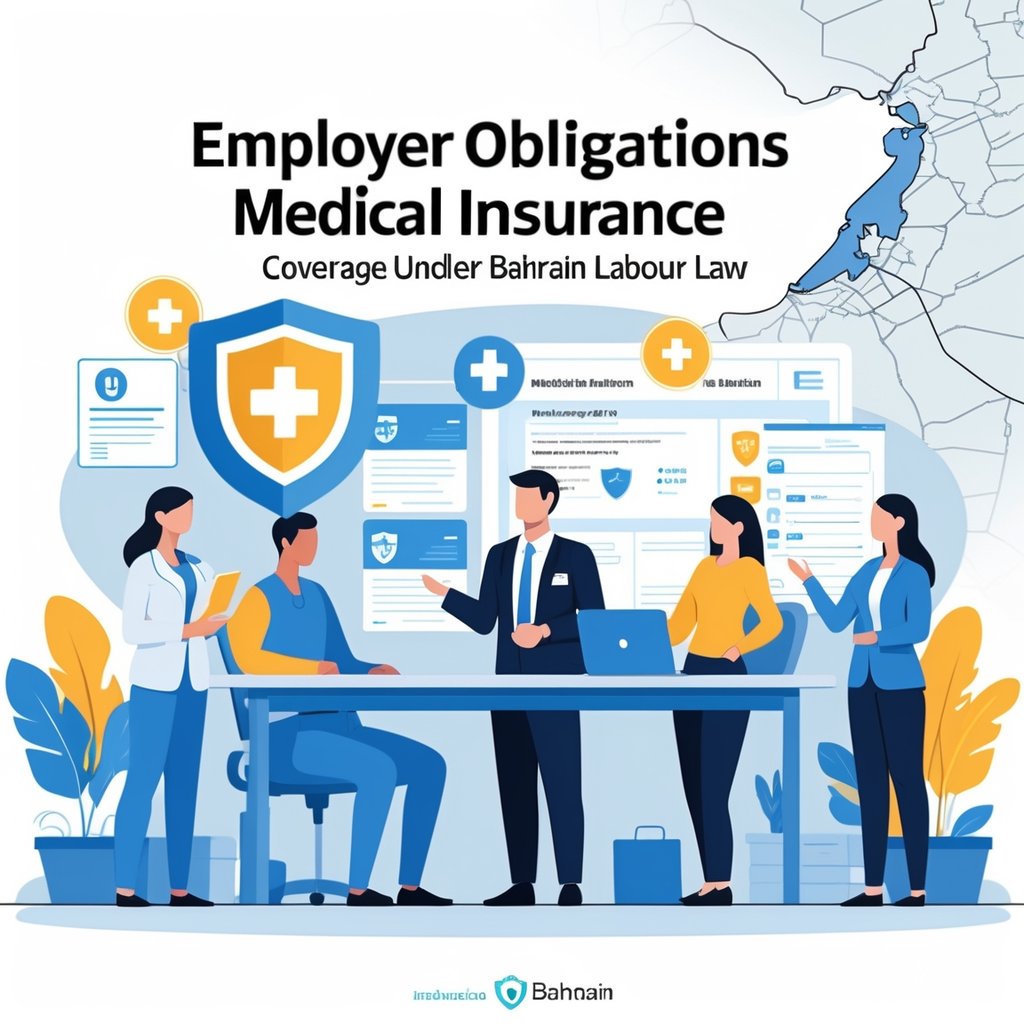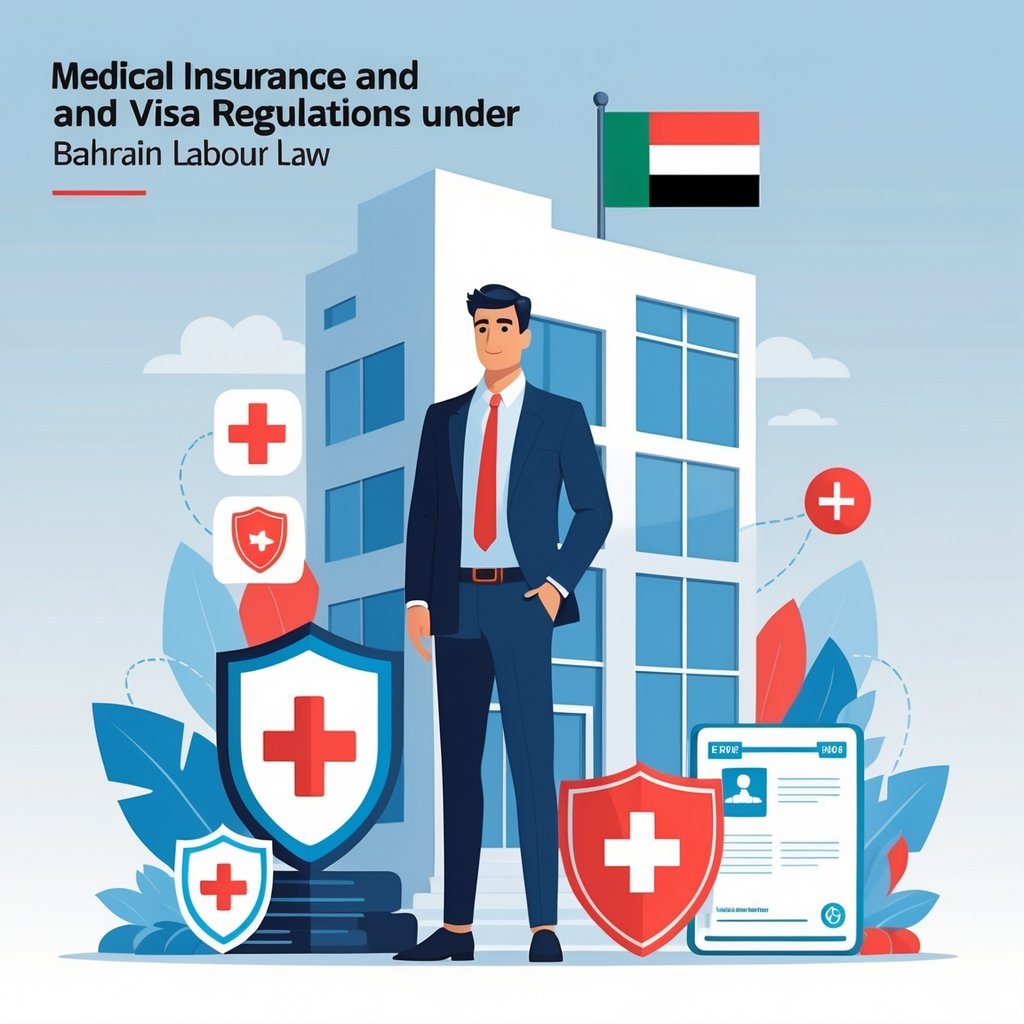Bahrain’s employment scene changed a lot with the introduction of mandatory health insurance for all workers.
The Ministry of Health confirmed that in 2025, all private sector employers in Bahrain must provide mandatory health insurance for their employees under the Health Insurance Law issued in 2018. This rule covers both Bahraini nationals and expatriate workers in the private sector.

Understanding these insurance obligations matters for business compliance and avoiding penalties.
Employers must pay health insurance subscription fees for non-Bahraini workers through compulsory health packages for residents.
The original law took effect in 2019, but authorities have rolled it out gradually, with 2025 as the big enforcement year.
Getting Bahrain’s health insurance requirements right means more than just buying policies.
You have to know your obligations, check compliance on government portals, and make sure your workers actually get the benefits.
Key Takeaways
- All private sector employers in Bahrain must provide mandatory health insurance coverage for employees starting in 2025
- Employers must pay health insurance subscription fees for non-Bahraini workers under compulsory resident packages
- Compliance monitoring through the Ministry of Health’s Sehati portal is essential to avoid penalties
Overview of Bahrain Labour Law and Health Insurance Requirements

Bahrain’s labour law framework requires mandatory health insurance for all private sector employees as of 2025.
The legal requirements come from several legislative acts that set out employer obligations.
Legal Basis for Mandatory Medical Insurance
Health Insurance Law No. 23 of 2018 governs employer obligations.
This law says all citizens, residents, and visitors must maintain health insurance.
The Ministry of Health confirmed in 2025 that all private sector employers must provide health insurance for their employees.
You need to keep an eye on decisions from the Ministry of Health’s Sehati platform for updates.
Key Legislative Framework:
- Health Insurance Law No. 23 of 2018
- Labour Law No. 36 of 2012
- Social Insurance Law of 1976
- Public Health Law of 2018 with 2021 executive bylaws
Employers must comply with these laws that create the insurance obligations.
Scope of Coverage Under Labour Law
Private health insurance requirements apply to all employees in the private sector.
The mandatory health insurance system covers nationals, residents, and expatriate workers.
Employers must use approved health insurance providers.
Coverage levels depend on employee categories and must meet minimum standards set by authorities.
Coverage Requirements:
- All private sector employees
- Bahraini nationals and expatriate workers
- Insurance through approved providers only
- Category-specific coverage levels
Compliance means arranging insurance with appropriate coverage for each employee category.
You can’t treat local and foreign employees differently when it comes to basic health insurance.
Employer Obligations for Medical Insurance Coverage

Private sector employers in Bahrain must provide health insurance for all employees starting in 2025.
Employers have to meet specific enrollment requirements and can get penalized for missing them.
Mandatory Insurance Enrollment for Employees
All private sector employers in Bahrain are required to provide mandatory health insurance for their employees as of 2025.
The Ministry of Health says this applies to every private company in the kingdom.
Employers cannot hire foreign workers unless they enroll them in health insurance first.
This ensures every expatriate employee has medical protection from day one.
Key enrollment obligations:
- Give all necessary employee info to insurance providers
- Enroll worker dependents if the contract requires it
- Use approved insurance providers
- Keep insurance active throughout employment
You must provide all information and data necessary on your non-Bahraini employees to insurance companies.
This includes personal details, job info, and any medical history needed for approval.
Employers can’t make employees pay for their health insurance costs.
The law blocks employers from passing these expenses to workers.
Penalties for Non-Compliance
Monitor the Ministry of Health’s Sehati portal to ensure compliance when the law takes full effect.
The portal gives updates and helps track your compliance status.
Failing to provide health insurance will get you penalized.
Employers need to secure coverage with Bahrain-based insurance providers to avoid fines.
Compliance steps to avoid penalties:
- Register with approved local insurance providers
- Keep coverage active for all employees
- Submit documents on time
- Check the Sehati portal for updates
Companies that miss health insurance requirements pay more than just basic fines.
You might also run into problems with visa processing and work permit renewals for employees who aren’t covered.
Benefits and Coverage Details for Employees

Under Bahrain’s health insurance law, employees get medical coverage through their employer.
The government requires private sector companies to offer mandatory health insurance for their employees starting in 2025.
Minimum Coverage Requirements
Employers must provide basic medical coverage including essential healthcare services.
The health insurance system covers nationals, residents and expatriate workers under this program.
Emergency and Primary Care
- Emergency treatment at hospitals
- Primary healthcare services
- Basic consultations with doctors
Medical Services Included
Coverage includes several main medical services:
- Hospital stays and treatments
- Surgeries
- Doctor visits
- Prescription drugs
If you’re a foreign worker, you get full coverage through state medical services for emergency and primary care only.
Private health insurance might give you extra services beyond the minimum.
Employee and Dependent Rights
Employees have certain rights regarding medical coverage and family members.
The employer pays health insurance contributions as part of the work permit process.
Coverage for Family Members
Dependents may get coverage if your contract allows it.
The law lets employers provide insurance for families, but it depends on your contract.
Access to Private Healthcare
You can use private health services if your plan covers them.
When using private healthcare, you might pay up to 40 percent of costs, while the government handles the rest.
Penalties for Non-Compliance
Employers face real penalties if they don’t provide coverage.
Criminal and civil penalties of up to BHD 50,000 apply to employers who skip enrolling foreign workers in the scheme.
Impact of Bahrainisation and Workforce Quotas on Health Insurance

Bahrain’s workforce nationalization policies shape how employers handle health insurance.
New Bahrainisation targets for 2025 add extra compliance requirements on top of health insurance coverage.
Bahrainisation Targets and Employer Responsibilities
Private sector employers face stricter Bahrainisation quotas that limit foreign workers to 30 percent of the workforce under draft laws.
This changes your health insurance planning and costs.
Employers must provide health insurance for all employees, no matter their nationality.
Key responsibilities:
- Get health insurance with Bahrain-based providers
- Cover both Bahraini nationals and expatriates
- Track workforce composition to meet quotas
- Adjust coverage as you hire more locals
The healthcare sector has its own challenges.
Bahrain approved Bahrainisation in healthcare with a 50 percent quota, but many industry groups said this isn’t practical.
Insurance costs can shift as you change your workforce mix.
Bahraini employees often need different coverage than expatriates under the national system.
Consequences of Failing to Meet Bahrainisation Quotas
Employers face stricter penalties under 2025 labour law amendments.
Missing both workforce quotas and health insurance rules brings double penalties.
Financial consequences:
- Fines for missing Bahrainisation targets
- Penalties for lacking health insurance
- Possible work permit restrictions
- More scrutiny from labor authorities
You should monitor the Ministry of Health’s Sehati portal for compliance updates.
This helps you stay on top of nationalization and health insurance requirements.
Government ministers confirmed that private healthcare providers face employment bans when equally qualified Bahrainis are available.
This policy now extends beyond healthcare to other sectors too.
Your business could face real disruptions if you can’t hire expatriate workers because of quota problems.
Planning your workforce and insurance together helps avoid these headaches.
Medical Insurance and Visa Regulations

Private sector employers must provide mandatory health insurance coverage for all employees in 2025.
New visa conversion fees will directly affect insurance requirements for foreign workers and their families.
Medical Insurance for Expatriate Workers
You need to secure health insurance for your expatriate workforce to avoid penalties. The Ministry of Health says all private sector employers in Bahrain must provide mandatory health insurance for employees starting in 2025.
Your insurance obligations come from Health Insurance Law No. 23 of 2018. The law was issued in 2018, but implementation is still waiting for an official decision.
Key Requirements:
- Coverage for all private sector employees
- Bahraini nationals and expatriate workers included
- Insurance must meet approved provider standards
Keep an eye on the Ministry of Health’s Sehati portal for compliance updates. The mandatory system includes both public and private medical coverage options.
Employers who skip coverage risk financial penalties. The government will clarify the penalty structure after the official decision.
Family Reunification Visa Insurance Provisions
Visa conversion costs have jumped under new regulations. Converting a visit visa to a work visa now costs BHD 250, up from BHD 60, which is a 400 percent increase.
Family reunification visa conversions also use the BHD 250 fee. This applies to both visit visa to family reunification visa and family reunification visa to work visa.
Current Conversion Fees:
- Visit visa to work visa: BHD 250
- Visit visa to family reunification visa: BHD 250
- Family reunification visa to work visa: BHD 250
If your company does not meet Bahrainisation quotas, you pay double. Companies with more than 30 percent foreign workers face extra penalties.
The new fees started on December 20, 2024. Budget for these higher costs in your recruitment and visa processing for expatriate workers and their families.
Compliance, Administration, and Government Resources

Bahrain’s government uses digital tools and regulatory oversight to make sure employers follow health insurance requirements. The Labour Market Regulatory Authority works with other agencies to monitor compliance and enforce penalties.
Utilizing the Sehati Portal for Insurance Management
The Sehati portal is Bahrain’s main digital platform for health insurance compliance and employee enrollment. You need to use this system to register expatriate workers and track their insurance.
Key Portal Functions:
- Employee registration and enrollment
- Insurance contribution payments
- Compliance status monitoring
- Document submission and verification
You can check real-time updates on your workers’ insurance through the portal. The system links with work permit renewals to keep you compliant.
Your HR team should assign portal admins for daily management. Using the portal regularly helps prevent compliance gaps that could lead to penalties up to BHD 50,000.
The portal keeps centralized medical records through the Health Information and Knowledge Management Centre. This setup makes the insurance process smoother for everyone.
Government Oversight and Labour Market Regulatory Authority
The Labour Market Regulatory Authority checks health insurance compliance along with the Central Bank of Bahrain for insurance violations. These agencies inspect and investigate to make sure employers follow the rules.
Regulatory Responsibilities:
- LMRA: Work permit integration and expatriate worker compliance
- Central Bank: Insurance provider oversight and violation enforcement
- Supreme Council for Health: Contribution amount determination
If you don’t comply, you can face civil and criminal penalties. Authorities may fine you, block work permit renewals, or take legal action.
Inspectors check that employers provide mandatory health insurance for non-Bahraini staff. You need to keep proper documentation and enrollment records for everyone covered.
Frequently Asked Questions

Bahrain’s mandatory health insurance system makes employers provide coverage for expatriate workers. The government covers Bahraini nationals, but foreign workers only get limited state coverage for emergencies and basic care.
What are the medical insurance requirements for expatriates working in Bahrain?
You need to get health insurance for your expatriate employees under Bahrain’s mandatory health insurance law that started January 1, 2019. This rule applies to all foreign workers in your company.
Your expatriate staff get state medical coverage for emergencies and primary care. For other medical needs, you must arrange private insurance.
Insurance contributions for foreign workers are added to your work permit fees. The Supreme Council for Health sets the exact contribution amounts.
How is health insurance coverage regulated under Bahrain’s labor law?
The National Health Regulatory Authority manages Bahrain’s health insurance scheme for all workers. A dedicated fund contracts with medical providers.
Employees’ medical records are stored centrally at the Health Information and Knowledge Management Centre. This helps track and coordinate healthcare.
Bahraini citizens get government-funded coverage. Expatriates need employer-funded insurance.
What are the employer’s obligations regarding medical insurance for employees in Bahrain?
You must pay health insurance contributions for all expatriate employees in Bahrain. Sometimes you also need to cover their dependents, depending on the contract.
All private sector employers in Bahrain must provide mandatory health insurance for employees as of 2025. The Ministry of Health has confirmed this applies to everyone.
You need to enroll all foreign workers in the health insurance scheme. Enrollment connects directly to your work permit applications and renewals.
Are foreign workers entitled to government-provided health insurance in Bahrain?
Foreign workers get limited government coverage under Bahrain’s mandatory health insurance system. This only covers emergencies and primary care.
Visitors get even less, with access only to government-funded emergency care.
For full coverage, expatriate employees need employer-provided insurance. The government does not offer the same benefits to foreign workers as it does to nationals.
What are the consequences for failing to provide medical insurance to employees in Bahrain?
You risk serious penalties for not enrolling foreign workers in the health insurance scheme. Criminal and civil penalties can reach up to BHD 50,000.
Authorities enforce these rules strictly. If you don’t meet requirements, your work permit applications and renewals for foreign workers might get rejected.
This can disrupt your business operations in a big way.
How does Bahrain’s labor law handle medical insurance for part-time or contract workers?
2025 updates to employment regulations say employers must use written agreements for remote and gig workers. These agreements need to spell out insurance coverage.
The rules expect companies to treat office, part-time, and contract workers the same. Everyone gets the same basic health insurance protections.
You have to provide mandatory coverage for all workers, no matter how many hours they work. The law ignores job categories when it comes to health insurance.
All expatriate employees need to be covered under the mandatory system. No exceptions there.












